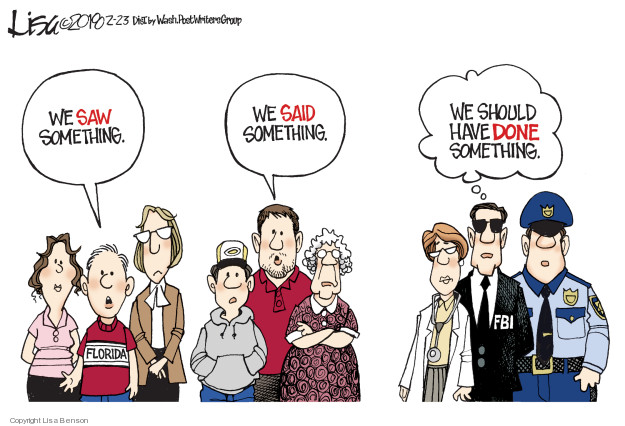
In addition to the several balls dropped by the local FBI office, it was later alleged that at least four
What follows is based partially on reporting by
In addition to Peterson's failure, "Two other deputies now on restricted duty and are being investigated for how they handled tips warning about the killer."
Beginning in 2008, when Cruz was 9, local authorities say they had received 23 calls about his troubling behavior.
Two years ago what appears to have been the most serious warning occurred when an anonymous caller alerted police that the killer had posted on Instagram a threat "to shoot up the school" and included a picture of himself with a gun.
The
The family that took Cruz in after his mother died later called police to report a fight and said that the boy had "dug in the backyard because he knew he was not allowed to bring (a gun in the house) ... he was going to bury the gun there."
The following day, the sheriff's office received a call from a tipster in
Was the
Sure, strengthen background checks and deny the right to legally buy firearms to mentally ill people and to minors, but anyone intent on breaking the law will not be stopped by new laws because, by definition, they are lawbreakers.
Deterrence remains the best defense against people like Cruz, who regularly search for the softest targets. There is no softer target than a school full of children. Properly trained and motivated armed adults will make the schools less appealing targets.
Here, a definition of deter might be helpful: "to discourage or restrain from acting or proceeding; to prevent; check; arrest."
If deterrence worked during the Cold War -- and it did ("peace through strength") -- it can work to protect school children.
I attended a high school musical last Saturday with friends in the
With the exception of laws dealing with the mentally ill and age restrictions, deterrence might work better than passing more laws, which lawbreakers will certainly break.
Cal Thomas, America's most-syndicated columnist, is the author of 10 books.


 Contact The Editor
Contact The Editor
 Articles By This Author
Articles By This Author